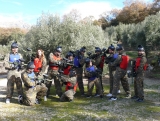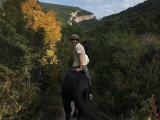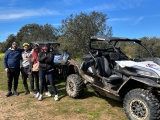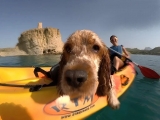If you're wondering what a mountaineer who has spent more than half his life climbing is like, you'll find the answer below. Jonatan Larrañaga has been dedicated to mountain climbing since he was 15, where he has experienced both awe-inspiring and, at times, painful moments. His passion for this sport has helped him overcome every obstacle in his path, and he has shared incredible moments with friends and colleagues—bonds that go far beyond simple friendship.
From a young age, he knew his calling was to traverse stunning landscapes, embark on expeditions, and pursue a hobby that would become his profession: climbing.

Yumping.- For those who don’t know you, tell us—what’s Jonatan like in his everyday life?
Jonatan Larrañaga.- A mountain enthusiast in every discipline of mountaineering. I love adventure, camaraderie, travel, and all the good things surrounding this sport. Depending on the season, I tend to focus on activities that match mountain conditions—ice climbing, skiing, freeride, rock climbing...
Y.- You’re about to turn 30 and already an expert in mountain sports. How did you decide to embark on this journey?
J.L.- I’ve been lucky to enjoy the mountains 100% since childhood. My family’s support, combined with my own motivation, has allowed me to make a living from the mountains.
Y.- I’ve read that by 19, you were already guiding clients to the summit of Mont Blanc... Did you turn your hobby into a profession?
J.L.- At 18, I started training as a high-mountain guide at the Spanish school in Benasque, and by 25, I became the youngest guide in the country. I’ve always known this was my path, and climbing alongside some of the world’s best guides and mountaineers has been invaluable.

Y.- Every profession has tough beginnings—aside from rocky outcrops, did you face any major hurdles?
J.L.- This profession has its tragic side—objective dangers like rockfalls, avalanches, and seracs. These are beyond your control, and luck plays a role. Sadly, I’ve witnessed several accidents up close, including fatalities. It makes you question whether it’s worth continuing, but something inside keeps you climbing.
Y.- Families often worry about their children taking risks. How did yours react to your career?
J.L.- As I mentioned, I’ve had full support at home, which helped. From a young age, I explored the Basque Country’s mountains. A winter ascent of the Naranjo de Bulnes at 15 was a turning point—it opened my mind to mountaineering.
Y.- For our readers and Yumping.com Community members, what advice would you give before starting climbing?
J.L.- Enjoy the moment and the surroundings.

Y.- Among all the mountains and remote places you’ve visited, which holds the fondest memories?
J.L.- Many destinations are worth recommending, but Pakistan stands out. The Karakoram range in the Himalayas is special—not just for the peaks, but the people, culture, and terrain. In Europe, Chamonix is the mecca of mountaineering.
Y.- Tell us about your most memorable climbing anecdote.
J.L.- Recently, I joined a rescue mission in Pakistan for a friend trapped on a ledge at 6,500m on Latok II (7,100m). It was the most intense experience I’ve had. Leaving Óscar up there left an indescribable weight.
Y.- Teamwork is crucial in long expeditions. How is the dynamic among your team?
J.L.- Excellent—I’m lucky to climb with close friends. A positive atmosphere is vital, and it’s one of the most beautiful aspects of mountaineering.
Y.- One of the hardest moments must be when bad weather forces you to abandon a route. How tough is that?
J.L.- Sometimes, the summit becomes secondary—retreating is wiser than risking avalanches. It depends on the mountain, your route plan, and technical factors hard to summarise.
Y.- What’s the best takeaway from each adventure?
J.L.- The freedom, landscapes, solitude, effort, and shared moments with mates.

Y.- What’s the worst experience you’ve had?
J.L.- During guide training, a close friend died in an avalanche on a north face in the Alps. It was one of my darkest moments.
Y.- How did it feel winning the 2007 Best Basque Mountaineer award from Euzkal Mendizale?
J.L.- I appreciated the recognition, but I’m not passionate about mountain awards.
Y.- What’s your next adventure?
J.L.- I have several projects in mind, but adventure is daily—most climbing happens near home. Expeditions are enriching, but summits depend on many factors.

Y.- Climbing... until your body gives out, right?
J.L.- Yes, barring injuries, it’s a lifelong sport. I have 50-year-old friends still climbing at the highest level with undimmed passion.












